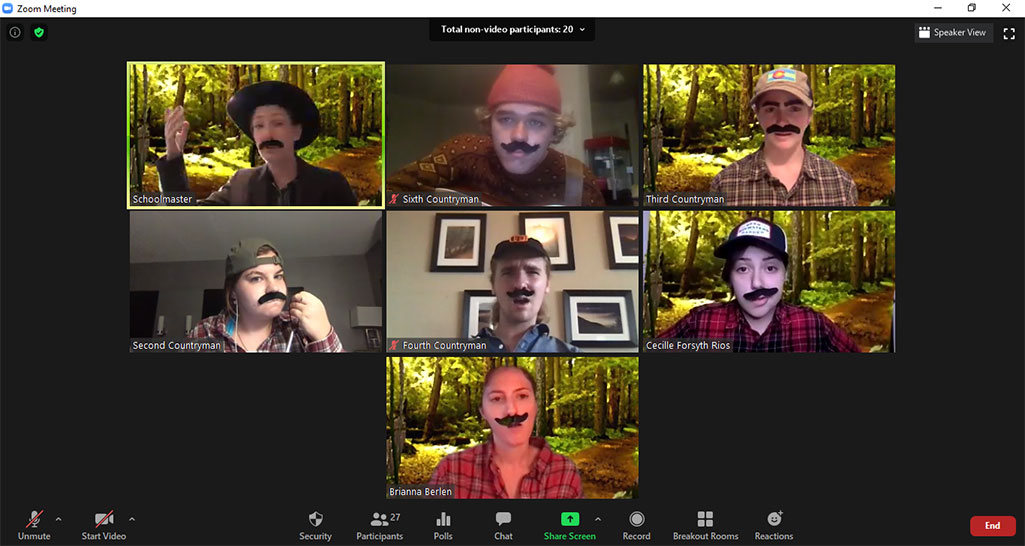Zoom is the playground for LMU’s virtual Shakespeare on the Bluff
Story by Shanee Edwards

LMU theatre students perform Shakespeare’s ‘The Two Noble Kinsmen’ on Zoom due to the pandemic
Theatre professor and director Kevin Wetmore admits he has a “bad habit” of wanting to do Shakespeare outdoors for free. He created his first Shakespeare festival in Connecticut when he was just 19 and didn’t stop there.
Having taught at Loyola Marymount University since 2005, it’s no surprise that when the college built Lawton Plaza, a big open-air amphitheater, Wetmore was compelled to create a summer Shakespeare program called Shakespeare on the Bluff that would provide free entertainment for the local community. The Bard’s most popular plays like “A Midsummer Night’s Dream” and “Othello” have been performed at Lawton Plaza and Playa Vista’s Concert Park and the Bandshell for the past two seasons.
Wetmore was all set to direct “The Tempest” and “Henry V” for the theater company’s third season when COVID-19 hit. “Obviously, it would not be wise to perform or gather together in crowds, so back in April we decided we just wouldn’t have a season this year, along with every other theater in Los Angeles,” says Wetmore.
Both he and his student actors were disappointed but understood there was no other choice until Wetmore got a phone call from LMU’s Dean of the College of Communications and Fine Arts, Bryant Keith Alexander. “He had seen the ‘Saturday Night Live’ they had done from their homes and said, ‘Could we do Shakespeare that way?’ The more I explored the possibility it seemed like, yes, we actually could do Shakespeare on Zoom,” says Wetmore.
To meet the challenge Wetmore decided to choose two of Shakespeare’s lesser-known plays, “All’s Well That Ends Well” and “The Two Noble Kinsmen.” The former was performed on Zoom on June 19, with cast members acting from their homes around the country, in cities like Atlanta, Miami and San Francisco. “The Two Noble Kinsmen” came to virtual life on Friday, July 17, also with cast members in various cities.
“I find that kind of thrilling – you’ve got people all over the United States coming together in a virtual space to present two of Shakespeare’s lesser-seen plays,” says Wetmore.
Much to Wetmore’s surprise, dozens of current and former LMU theater students responded to his request for actors when he posted the casting call on social media. He put together a company of thespians that includes two decades-worth of LMU theater students, from the classes of 2004 to 2023.
As exciting as this novel theater experiment has been for Wetmore, it also came with big challenges.
“The danger with doing Shakespeare on Zoom is it just becomes a whole bunch of talking heads and it becomes boring very quickly,” says Wetmore, who worked very hard with the actors to include visual surprises since competition for eyeballs is tough. “The audience could be binge-watching ‘Tiger King,’ so why should they make this choice?”
Another challenge is that no two actors occupy the same space, causing movement to be very restricted.
“‘Two Noble Kinsmen’ has a Moorish dance in the middle of it!” says Wetmore. A Moorish dance is a big group dance of 14 people singing and dancing in a circle. “How do you do that when no one’s in the same room? … It’s remarkable how inventive you have to become,” he says.
To give the illusion that actors are in the same room, Wetmore had his actors employ virtual backgrounds and had them hand props to other people off-camera at home, simulating the actors handing them to their scene partner.
“Someone hands something towards the camera and lowers it down so it drops out of the audience’s range of sight, and the other person picks it up, and we discovered it looked like they actually handed the other actor something through the computer. That’s really kind of cool,” Wetmore says.
Recent LMU graduate Olivia Oreskovich, now living in Hollywood to pursue her acting career, played Helena in “All’s Well That Ends Well” and played a herald and a messenger in “The Two Noble Kinsmen.” Oreskovich says at first it was a struggle to act on Zoom because she’s a very physical actor who likes to take up space.
“Adjusting that to a small box on Zoom seemed at first to be a tedious task,” she says. But both Wetmore and assistant director Kate Bianco encouraged the actors to really explore that space as if they were on a stage or in a park.
To light herself, Oreskovich used two box lights, and her kitchen light. She was prepared to use a ring light, like the ones YouTubers use, but the night before she performed in “All’s Well That End’s Well,” her ring light burned out.
“As luck would have it, my desk lamp took its place,” she says with a laugh.
But ingenuity and adaptability are nothing new in the theatrical world. Wetmore thinks William Shakespeare himself would appreciate this unusual approach to performing during a pandemic.
“Shakespeare wrote ‘King Lear’ during a time of plague, so he’s no stranger to having to change production,” says Wetmore. “Whether it’s the theater company going on tour because the theaters of London are closed down due to plague or deciding to perform in York instead of London, I think Shakespeare would see us as connected in terms of making it up as you go along in response to the current reality,” he says.
Oreskovich agrees. “I think Shakespeare would be inspired that actors are finding a way to persevere,” she says. “Just because we couldn’t see our audience, doesn’t mean this show was not for them. They are why we are performing, why we continue to be inspired and tell stories. I think any playwright would be happy to see that happening, especially in the world we’re living in now.”
Leave a Reply